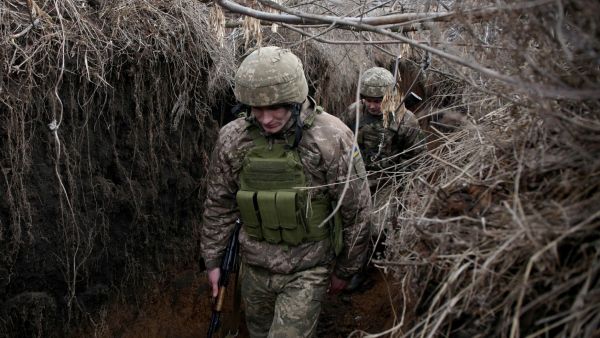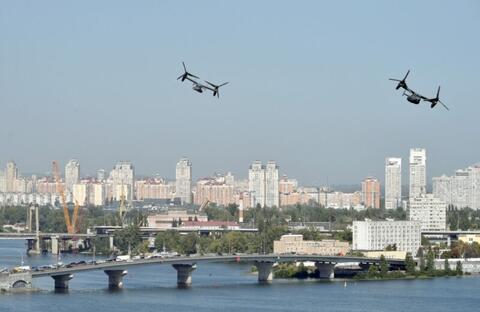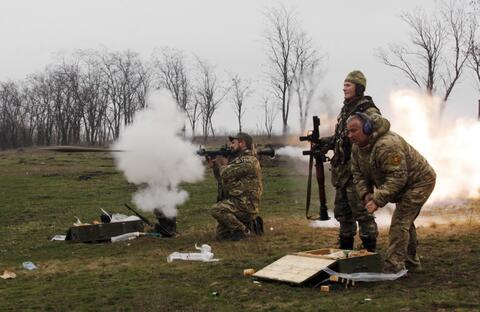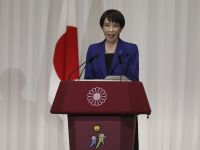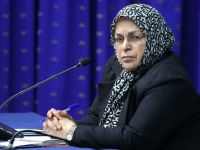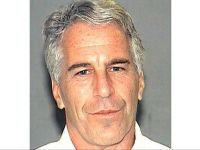Explosions shook eastern Ukraine late on Saturday, after the NATO chief warned the signals coming out of Russia suggest that Moscow is readying for a 'full-fledged attack' on Ukraine, and Vladimir Putin put on a show of military strength today with huge new nuclear drills.
Multiple explosions could be heard late on Saturday and early on Sunday in the centre of the separatist-controlled city of Donetsk in eastern Ukraine, according to a Reuters reporter.
#Ukraine ?? BREAKING: anti-aircraft fire over #Donetsk tonight.
— Thomas van Linge (@ThomasVLinge) February 19, 2022
No clue what they're firing at. pic.twitter.com/LZIKaVCFkq
The origin of the explosions was not clear. There was no immediate comment from separatist authorities or from Kyiv.
Two regions in eastern Ukraine, where government and separatist forces have been fighting since 2014, were hit by more than 1,400 explosions on Friday, monitors for the Organization for Security and Cooperation in Europe (OSCE) said, pointing to a surge in shelling.
And up to 700,00 civilians are being evacuated from the breakaway regions of Donetsk and Luhansk after rebel leaders yesterday claimed Ukraine was about to attack the areas.
It comes after Jens Stoltenberg, NATO chief, warned that the risk of an attack is 'very high', echoing US warnings that Russian troops dotted along Ukraine's border are 'uncoiling' and 'poised to strike'.
'Every indication indicates that Russia is planning a full-fledged attack against Ukraine,' Stoltenberg told German broadcaster ARD on the sidelines of the Munich Security Conference.
'We all agree that the risk of an attack is very high.'
The United States dominates NATO, and US President Joe Biden on Friday said he was 'convinced' Russia was going to invade Ukraine within the week, and have its forces target Ukraine's capital Kyiv.
NATO is relocating staff from Kyiv to Lviv, in the west of the country, and to the Belgian capital Brussels, which houses NATO's headquarters, for their safety, an alliance official said Saturday.
'The safety of our personnel is paramount, so staff have been relocated to Lviv and Brussels. The NATO offices in Ukraine remain operational,' the official told AFP, without giving numbers.
Several Western countries have already moved diplomats from Kiev to Lviv, located near the border with Poland, in anticipation of Russian military action.
Fears of tensions boiling over were backed up by figures released Saturday by the OSCE, which showed there were more than 1,400 explosions in the rebel held regions of Donetsk and Luhansk on Friday.
The OSCE's Special Monitoring Mission that is deployed in the conflict zone said it had logged 553 explosions in Donetsk and a further 860 in neighbouring Luhansk - adding that it had confirmed one civilian casualty in a government-controlled area of Donetsk.
It put the total number of ceasefire violations on Friday at more than 1,500, compared with 870 the day before, suggesting an upwards trajectory of gunfire and mortars.
Ukraine's Interior Minister Denys Monastyrskiy experienced the clashes first-hand Saturday, ducking for cover as mortar shells fell within a few hundred metres of him while he toured the frontline with reporters.
It came as US Secretary of Defense Lloyd Austin said on Saturday during a visit to Lithuania that Russian troops dotted along Ukraine's border are 'uncoiling' and 'poised to strike'.
He added that troops were 'moving into the right kinds of positions to be able to conduct an attack'.
Meanwhile, Putin put on a show of military strength today with huge new nuclear drills involving ballistic missiles, submarines, tank convoys and ship-based missiles.
In a released photo, the Russian president and Belarusian strongman Alexander Lukashenko - often dubbed the 'Europe's last dictator' - can be seen watching the sabre-rattling drills from a situation room in the Kremlin.
It came as world leaders gathered at the Munich Security Conference in Germany today - where Boris Johnson warned a Russian invasion of Ukraine could cause 'the destruction of a democratic state', adding that 'the shock will echo around the world'.
The Prime Minister said the 'omens are grim' from Russia on the possibility of an invasion in the coming days, and that the world could not 'underestimate the gravity of this moment'.
Ukrainian President Volodymyr Zelensky told Western powers at the conference to stop their 'appeasement' of Russia and warned sanctions will not work on Moscow once the bombing starts - which earned him a standing ovation from world leaders.
The conference had echoes of the 1938 summit in Munich in which leaders agreed a policy of appeasement against Adolf Hitler's Germany in an effort to prevent an imminent war.
Mr Zelensky said today: 'Ukraine has received security guarantees for abandoning the world's third-largest nuclear arsenal. We have no weapons. And no security ...
'But we have a right - a right to demand a shift from a policy of appeasement to one ensuring security and peace.'
He added: 'For eight years, Ukraine has been a shield. For eight years, Ukraine has been holding back one of the greatest armies in the world.'
Foreign ministers from the G7 group of rich nations said on Saturday they saw no evidence that Russia is reducing military activity near Ukraine's borders and remain 'gravely concerned' about the situation.
'We call on Russia to choose the path of diplomacy, to de-escalate tensions, to substantively withdraw military forces from the proximity of Ukraine's borders and to fully abide by international commitments,' the countries said in a joint statement released by Britain's foreign ministry.
'As a first step, we expect Russia to implement the announced reduction of its military activities along Ukraine's borders. We have seen no evidence of this reduction,' they added.
Elsewhere, NATO is relocating staff from Kyiv to Lviv, in the west of the country, and to the Belgian capital Brussels, for their safety, an alliance official said Saturday.
Ukraine is not a member of NATO, and the alliance does not have any forces there, but since the late 1990s it has maintained two offices in Kyiv - a NATO Liaison Office and a NATO Information and Documentation Centre.
The liaison office's job is keep up dialogue between NATO and Ukraine's government while encouraging a democratic transformation of Ukraine's defence and security sector.
According to NATO's website, it consisted of a civilian head leading a mixed team of NATO military and civilian personnel. The web page, last updated in 2016, said there were a total of 16 staff.
The NATO Information and Documentation Centre's number of personnel was not disclosed. Its job was to inform the Ukrainian public about NATO and support Ukrainian institutions in their communications.
Stoltenberg has previously said that the alliance will not deploy any forces into Ukraine to defend it from any Russian aggression.
But NATO members have sent forces to neighbouring countries which are alliance members, and Stoltenberg has said NATO member countries will vigorously react to any Russian action in those territories, under its collective defence pact.
It comes as the Russians are continuing their 'false flag' operations in Eastern Ukraine, seemingly designed to provoke conflict.
Thousands of Ukrainian refugees are starting to stream into Russia today after Vladimir Putin's allies ordered a mass evacuation of two separatist republics as part of a suspected 'false flag' operation to provide the pretext for an invasion.
Up to 700,000 civilians are being evacuated from the breakaway regions of Donetsk and Luhansk after rebel leaders yesterday claimed Ukraine was about to attack the areas.
Hours later, a car bomb rocked Donetsk in an alleged 'assassination attempt' of a top Putin-allied official, which Western intelligence agencies believe was faked as part of the 'false flag' deception.
Later two explosions at a 'gas pipeline' rocked the separatist city of Luhansk in eastern Ukraine in another suspected false flag attack.
Elsewhere, the Russian leader is personally overseeing nuclear exercises involving 'strategic forces' which will include practice launches of intercontinental ballistic missiles and cruise missiles.
The Kremlin nuclear drills also involved Mig fighter bombers armed with hypersonic missiles patrolling over the Mediterranean from their bases in Syria.
Belarusian strongman Alexander Lukashenko is joining Putin in the situation room in the Kremlin to watch over the strategic drills.
Kremlin spokesman Dmitry Peskov said today's drills 'should not cause anyone concern' and said Russia had informed the proper channels.
Russia holds huge strategic drills every year but today's manoeuvres include the Black Sea Fleet, based on the Crimean Peninsula annexed by Russia in 2014.
Meanwhile, top Ukrainian military officials came under a shelling attack during a tour of the front of the separatist conflict in eastern Ukraine and were forced to flee to a bomb shelter before leaving the area.
Russia has also sent a MIG-31K and a Tu-22M3 bomber over the Mediterranean in another show of force amid the rising tensions.
The warplane is deployed with the new ultra high speed Kinzhal air-launched ballistic missiles.
The 24-foot-long, one-ton Kinzhal - or Dagger - can carry conventional or nuclear warheads, and Russia boasts it has no match among Western defences.
The hypersonic Kinzhal has a range of 1,250 miles and could pummel Ukrainian troops and defences without flying close to the country.
Russia is believed to have around 20 Kinzhal-compatible MiG-31Ks in total.
Video footage has also emerged which graphically demonstrates the sheer intensity of the bombardment that Russian-backed forces have unleashed on Ukraine in the last two days.
In night-time footage taken from the port city of Mariupol on the Sea of Azov, just a few miles from the front line, shells could be heard raining down almost incessantly on Ukrainian positions for five hours.
The distant flashes from the exploding 122mm and 152mm heavy artillery and mortars on the video posted on censor.net were reminiscent of WW1 trench warfare.
One resident of the city posted on Facebook: 'No-one in Mariupol is sleeping tonight.'
According to the Ukrainian government there were a total of 66 ceasefire violations by the pro-Russian rebels overnight, involving hundreds of shells.
In a separate incident at a front-line checkpoint at Schastia, which ironically means 'Happiness' in Ukrainian, more incoming shells blasted onto a car park in daytime CCTV footage provided by the Ukraine government.
Shelling also damaged a pumping station in Donetsk Oblast, threatening water supply to 46 towns and villages in the Ukrainian-controlled parts of the region, Ukraine's authorities reported.
Amid the new drills today, US Secretary of Defence Lloyd Austin said the troops on the border are 'uncoiling' and 'poised to strike' during a visit to Lithuania.
'They are uncoiling and are now poised to strike,' he said, adding that troops were 'moving into the right kinds of positions to be able to conduct an attack'.
Meanwhile Boris Johnson warned an invasion of Ukraine could cause 'the destruction of a democratic state' and 'the shock will echo around the world'.
Speaking at the Munich Security Conference today, the Prime Minister said the 'omens are grim' from Russia on the possibility of an invasion in the coming days, and that the world could not 'underestimate the gravity of this moment'.
Mr Boris jetted to the annual summit in Bavaria to make a plea to avoid 'unnecessary bloodshed' by diplomatic means if the West speaks with 'one voice'.
In a meeting with Ukrainian President Volodymyr Zelenskyy, Mr Johnson said: 'If Ukraine is invaded and if Ukraine is overwhelmed, we will witness the destruction of a democratic state, a country that has been free for a generation, with a proud history of elections.
It comes as thousands of Ukrainian refugees are streaming into Russia today after Putin's allies ordered a mass evacuation of two separatist republics as part of a suspected 'false flag' operation to provide the pretext for an invasion.
Shelling in #Donetsk pic.twitter.com/JHsVOxgtlR
— Guy Elster (@guyelster) February 19, 2022
Up to 700,00 civilians are being evacuated from the breakaway regions of Donetsk and Luhansk after rebel leaders yesterday claimed Ukraine was about to attack the areas.
Hours later a car bomb rocked Donetsk in an alleged 'assassination attempt' of a top Putin-allied official, which Western intelligence agencies believe was faked as part of the 'false flag' deception.
Later two explosions at a 'gas pipeline' rocked the separatist city of Luhansk in eastern Ukraine in another suspected false flag attack.
Last night, US President said he is 'convinced' the Russian premier has made up his mind to launch an invasion after amassing almost 200,000 troops on the border.
In a televised address from the White House, Mr Biden said he has 'reason to believe' it will occur in the 'coming days' and will include an assault on the capital Kyiv.
After weeks of saying the US was not sure if Mr Putin had made the final decision to launch a widespread invasion, Mr Biden said that assessment had changed.
'As of this moment I'm convinced he's made the decision,' Mr Biden said. 'We have reason to believe that.'
He cited the United States' 'significant intelligence capability' for the assessment.
The Ukrainian civilian refugees will be housed in tent cities provided by Putin's government in Russia where they will receive a gift of $132.
False flag suspicions were also fueled by time stamps on the videos announcing the evacuations, that show they were taped by rebel leaders two days before being released.
Huge convoys of buses were laid on the for the refugees, after the evacuation was announced in video addresses by the leaders of the breakaway Republics which have also ordered a general mobilisation of all men to the army.
Multiple explosions could be heard on Saturday morning in the north of the separatist-controlled city of Donetsk in eastern Ukraine, a Reuters witness said. The origin was not immediately clear. Ukraine said earlier that one of its soldiers had been killed.
Denis Pushilin, the leader of the so-called Donetsk People's Republic, has called on all men 'who are in the reserves to come to military conscription offices' following a mass evacuation of women and children in Ukraine's breakaway provinces to southern Russia.
Leonid Pasechnik, the leader of the Luhansk separatist region in Ukraine, ordered a general mobilisation shortly afterwards.
Pushilin claimed his region's forces had prevented attacks he said were planned by Ukraine, and that the Ukrainian army had continued manoeuvres.
Separatist authorities on Friday announced plans to evacuate around 700,000 people, citing fears of an imminent attack by Ukrainian forces – an accusation Kiev flatly denied.
Less than 7,000 people had been evacuated from Donetsk as of Saturday morning, the local emergencies ministry said.
The Ukrainian military said it had recorded 12 ceasefire violations by pro-Russian separatists in eastern Ukraine in the morning after 66 cases in the previous 24 hours. Separatist authorities also reported what they said was shelling by Ukrainian forces of several villages on Saturday. Both sides regularly trade blame for ceasefire violations.
Kiev has repeatedly denied any plans to regain control of separatist-held areas using force, including the Crimean peninsula annexed by Moscow in 2014. More than 14,000 people have been killed in fighting between Ukraine's army and Russia's proxies.
It comes as Ukraine's army claimed today a soldier had been killed in the separatist east and Volodymyr Zelensky is heading to the Munich Security Conference, despite President Joe Biden's warning not to leave Ukraine through fear of an imminent invasion.
Yesterday Biden said he is now 'convinced' Vladimir Putin has decided to invade Ukraine and assault the capital.
After weeks of saying that Washington was not sure if Putin had made the final decision, the US President said that his judgment had changed, citing American intelligence. He reiterated that the assault could occur in the 'coming days'.
His comments followed a day of rising violence that included a humanitarian convoy hit by shelling and a car bombing in the eastern city of Donetsk.
Pro-Russian rebels began evacuating civilians from the conflict zone with an announcement that appeared to be part of Moscow's efforts to paint Ukraine as the aggressor instead.
One of Vladimir Putin's closest allies, parliament speaker Vyacheslav Volodin vowed that Russia would 'defend' its compatriots in the Donbas, hinting at military intervention.
He said: 'Russia doesn't want war.
'Our president Vladimir Putin repeatedly said this earlier and is saying this these days.'
But 'if danger arises to the lives of Russians and compatriots living in the DPR and LPR, our country will defend them.'
This came as pro-Moscow rebels claimed a water-pumping station in Vasilievka was hit by Ukrainian fire.
Ukraine has denied any such attacks.
Meanwhile, the Kremlin has announced massive nuclear drills to flex its military muscle, and Putin pledged to protect Russia's national interests against what it sees as encroaching Western threats.
Biden reiterated his threat of crushing economic and diplomatic sanctions against Russia if it does invade, and pressed Putin to reconsider. He said the US and its Western allies were more united than ever to ensure Russia pays a steep price for any invasion.
He said: 'We're calling out Russia's plans. Not because we want a conflict, but because we are doing everything in our power to remove any reason Russia may give to justify invading Ukraine.
'If Russia pursues its plans, it will be responsible for a catastrophic and needless war of choice.'
Earlier on Friday, Biden said he believed Putin had already made up his mind to invade Ukraine.
He said: 'As of this moment, I'm convinced he's made the decision. We have reason to believe that.'
He said it was based on Washington's 'significant intelligence capability.' But he insisted Putin could change course if he wanted to.
'Russia can still choose diplomacy,' he said. 'It is not too late to de-escalate and return to the negotiating table.'
As further indication that the Russians are preparing for a major military push, a US defence official said an estimated 40 per cent to 50 per cent of the ground forces deployed in the vicinity of the Ukrainian border have moved into attack positions closer to the border.
That shift has been under way for about a week, other officials have said, and does not necessarily mean Putin has decided to begin an invasion.
The official also said the number of Russian ground units known as battalion tactical groups in the border area had grown to as many as 125, up from 83 two weeks ago. Each group has 750 to 1,000 soldiers.
Lines of communication remain open. The US and Russian defence chiefs spoke on Friday, and US secretary of state Antony Blinken and Russian foreign minister Sergei Lavrov agreed to meet next week.
Ukrainian President Volodymyr Zelenskiy will attend the Munich Security Conference on Saturday and return home later the same day, a statement from his office said.
Zelenskiy's trip had been under scrutiny due to concern in Western countries that Russia is poised to launch a military offensive against Ukraine and could do so while the president is out of the country.
Boris Johnson has called for western leaders to unite against Putin and show the Russian leader he will pay a 'high price' if he sends his troops into Ukraine.
The Prime Minister will head to the Munich Security Conference on Saturday to make a plea for 'unnecessary bloodshed' to be avoided by pursuing a diplomatic route to prevent a conflict in eastern Europe.
Only hours before Biden's statement, the UK Foreign Office announced it had decided to 'temporarily' move its diplomats out of Kyiv, relocating them to the west of the country. The department said British embassy officials will relocate to Lviv, situated near the border with Poland.
With estimates that 150,000 Russian troops are posted around Ukraine's borders, Johnson has previously called the situation 'very grim'.
But in comments made before embarking on his trip to Germany, the Prime Minister said 'diplomacy can still prevail' if the West puts on a united front in terms of agreeing punishing sanctions to slap on Moscow.
'There is still a chance to avoid unnecessary bloodshed, but it will require an overwhelming display of western solidarity beyond anything we have seen in recent history,' he said.
'Allies need to speak with one voice to stress to President Putin the high price he will pay for any further Russian invasion of Ukraine. Diplomacy can still prevail. That is the message I will take to Munich today as we redouble our efforts to prevent a grave miscalculation which would devastate Ukraine, Russia and the rest of Europe.'
The Bavarian summit will take place against the backdrop of Putin continuing to parade Russia's military might.
The Russian defence ministry has announced it will be carrying out fresh exercises on Saturday involving its strategic nuclear forces.
Putin will observe the drills involving multiple practice launches of intercontinental ballistic missiles and cruise missiles in a demonstration that Russia remains a nuclear superpower.
The Russian leader has insisted that the large-scale military exercises with Belarusian forces close to the Ukrainian border are 'purely defensive' and do not represent a threat to any other country.
There are concerns among western allies that the Kremlin could use disinformation and a possible 'false flag' operation to justify an offensive, particularly with growing activity in separatist-held areas of Ukraine.
Putin will hold a telephone call with French President Emmanuel Macron on Sunday as tensions spike in the crisis over Ukraine, Moscow said. Kremlin spokesman Dmitry Peskov said the call was 'on the president's schedule'.
With an estimated 150,000 Russian troops now posted around Ukraine's borders, the long-simmering separatist conflict could provide the spark for a broader attack.
Fears of such escalation intensified amid Friday's violence. A bombing struck a car outside the main government building in the rebel-held city of Donetsk. The head of the separatist forces, Denis Sinenkov, said the car was his, the Interfax news agency reported. There were no reports of casualties and no independent confirmation of the circumstances of the blast.
Shelling and shooting are common along the line that separates Ukrainian forces and the rebels, but targeted violence is unusual in rebel-held cities.
Adding to the tensions, two explosions shook the rebel-controlled city of Luhansk early on Saturday. The Luhansk Information Centre said one of the blasts was in a natural gas main and cited witnesses as saying the other was at a vehicle service station.
There was no immediate word on injuries or a cause. Luhansk officials blamed a gas main explosion earlier in the week on sabotage.
Monitors from the Organisation for Security and Cooperation in Europe reported more than 600 explosions in the war-torn east of Ukraine on Friday.
Separatists in the Luhansk and Donetsk regions that form Ukraine's industrial heartland known as the Donbas announced they were evacuating civilians to Russia.
Pushilin said women, children and the elderly would go first, and that Russia has prepared facilities for them. He alleged in a video statement that Ukrainian president Volodymyr Zelensky was going to order an imminent offensive in the area.
Metadata from two videos posted by the separatists announcing the evacuation show that the files were created two days ago.
US authorities have alleged that the Kremlin's disinformation campaign could include staged, pre-recorded videos.
Authorities began moving children from an orphanage in Donetsk, and other residents boarded buses for Russia. Long lines formed at gas stations as more people prepared to leave on their own.
Putin has ordered the government to offer a payment of 10,000 rubles (about £95) to each evacuee, equivalent to about half of an average monthly salary in the war-ravaged Donbas region.
By Saturday morning, more than 6,600 residents of the rebel-controlled areas were evacuated to Russia, according to separatist officials, who have announced plans to evacuate hundreds of thousands of people.
The explosions and the announced evacuations were in line with US warnings of so-called false flag attacks that Russia could use to justify an invasion.
UN Secretary-General Antonio Guterres said the threat to global security is 'more complex and probably higher' than during the Cold War.
He told a security conference in Munich that a small mistake or miscommunication between major powers could have catastrophic consequences.
Russia announced this week that it was pulling back forces from vast military exercises, but US officials said they saw no sign of a pullback and instead observed more troops moving toward the border with Ukraine.


